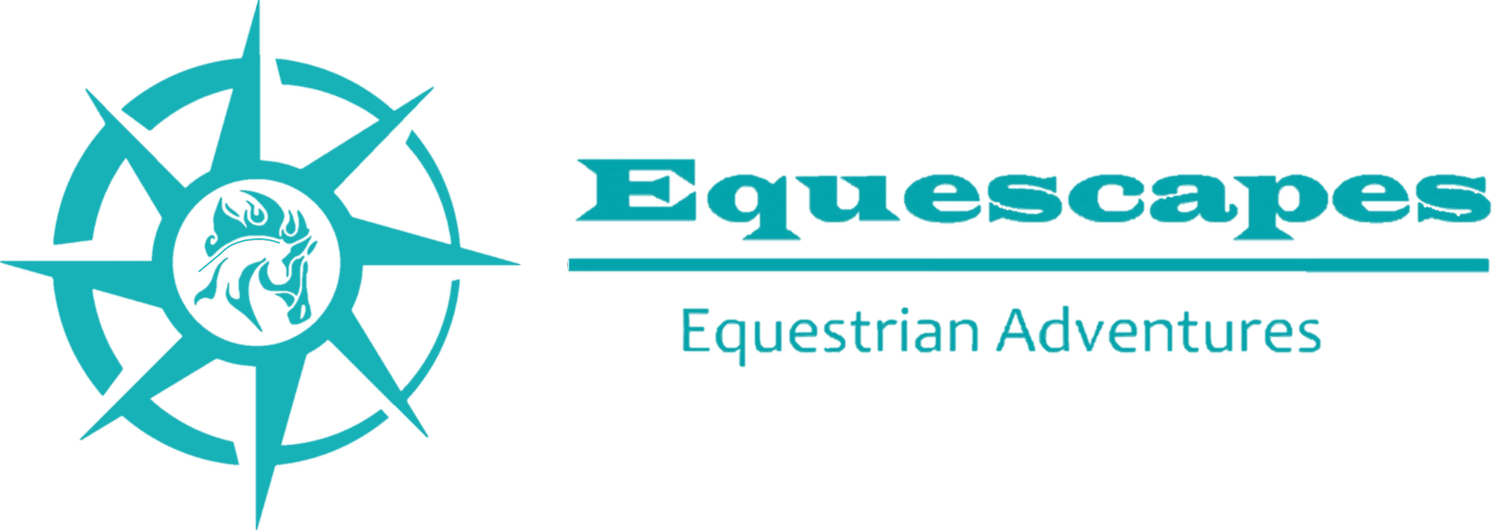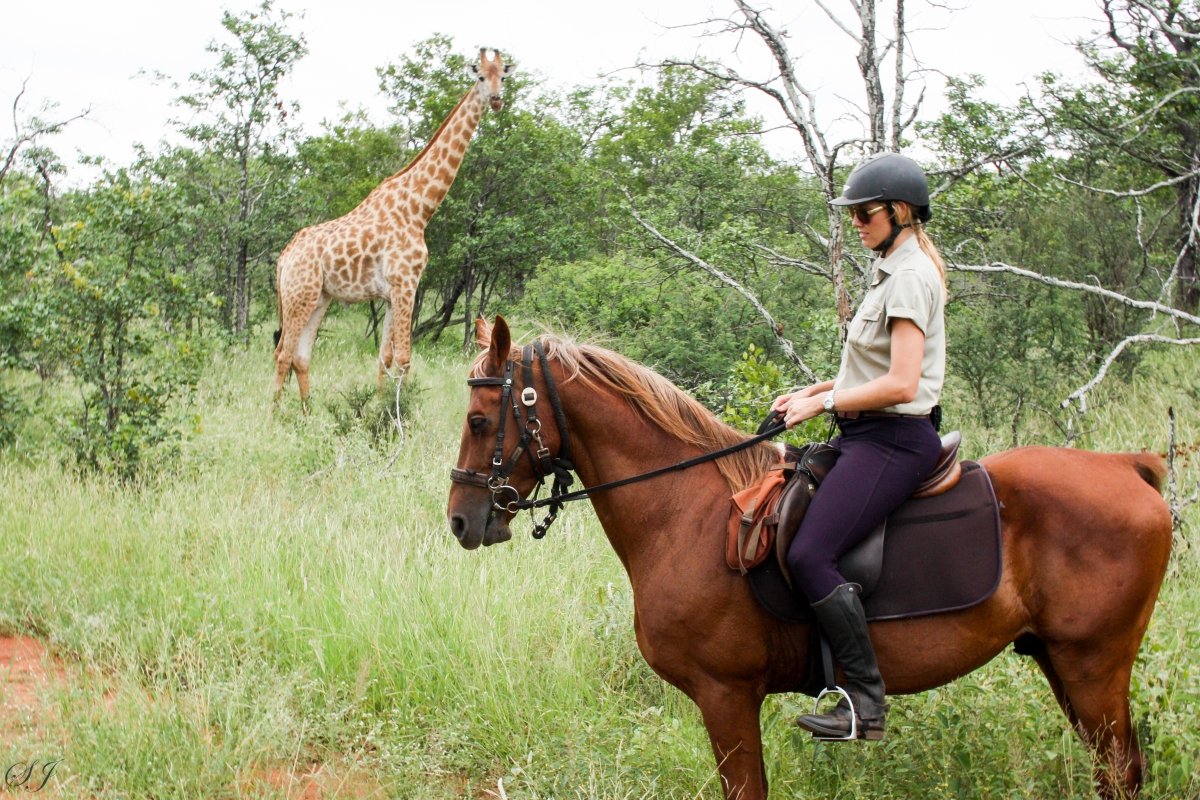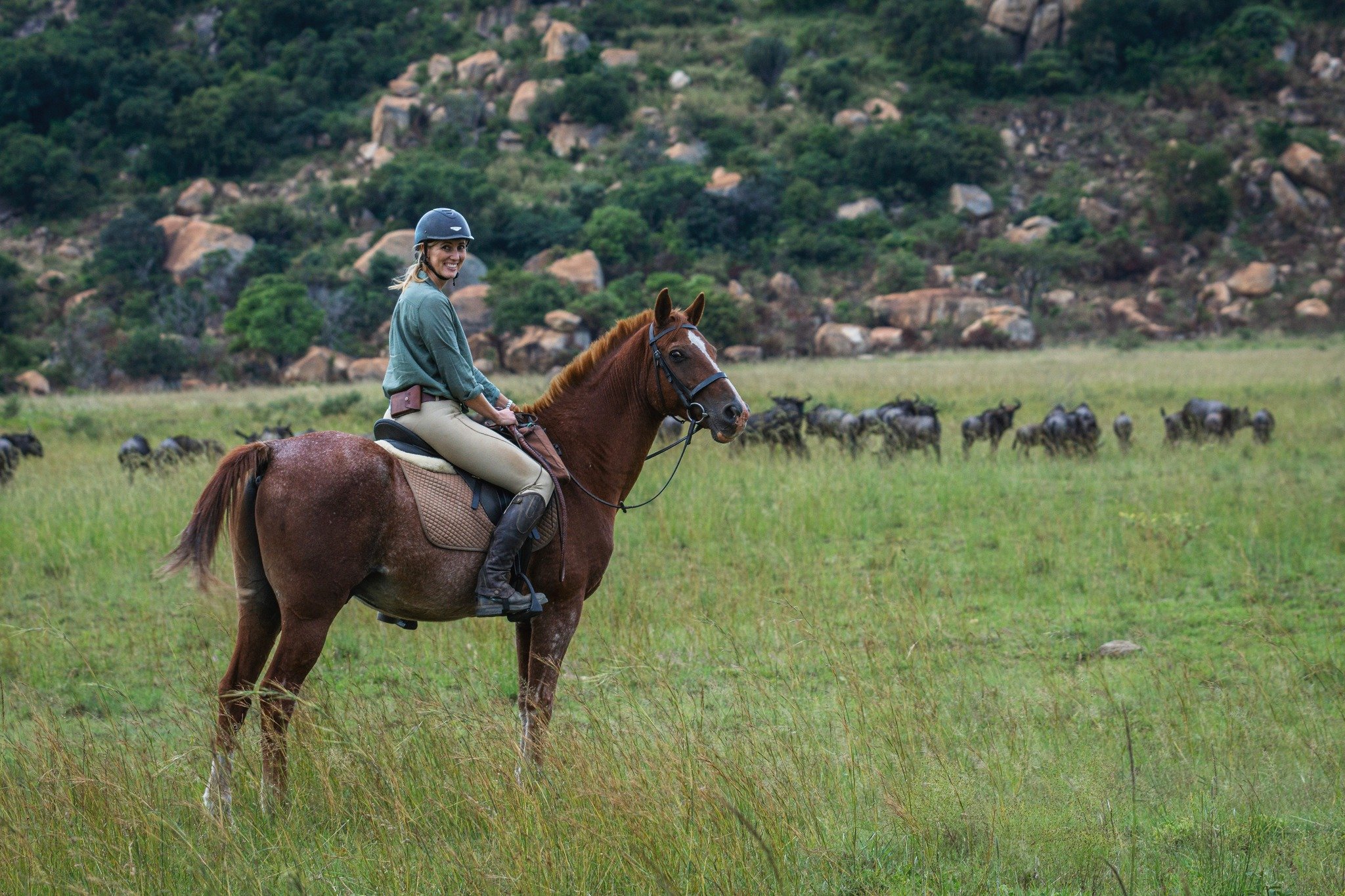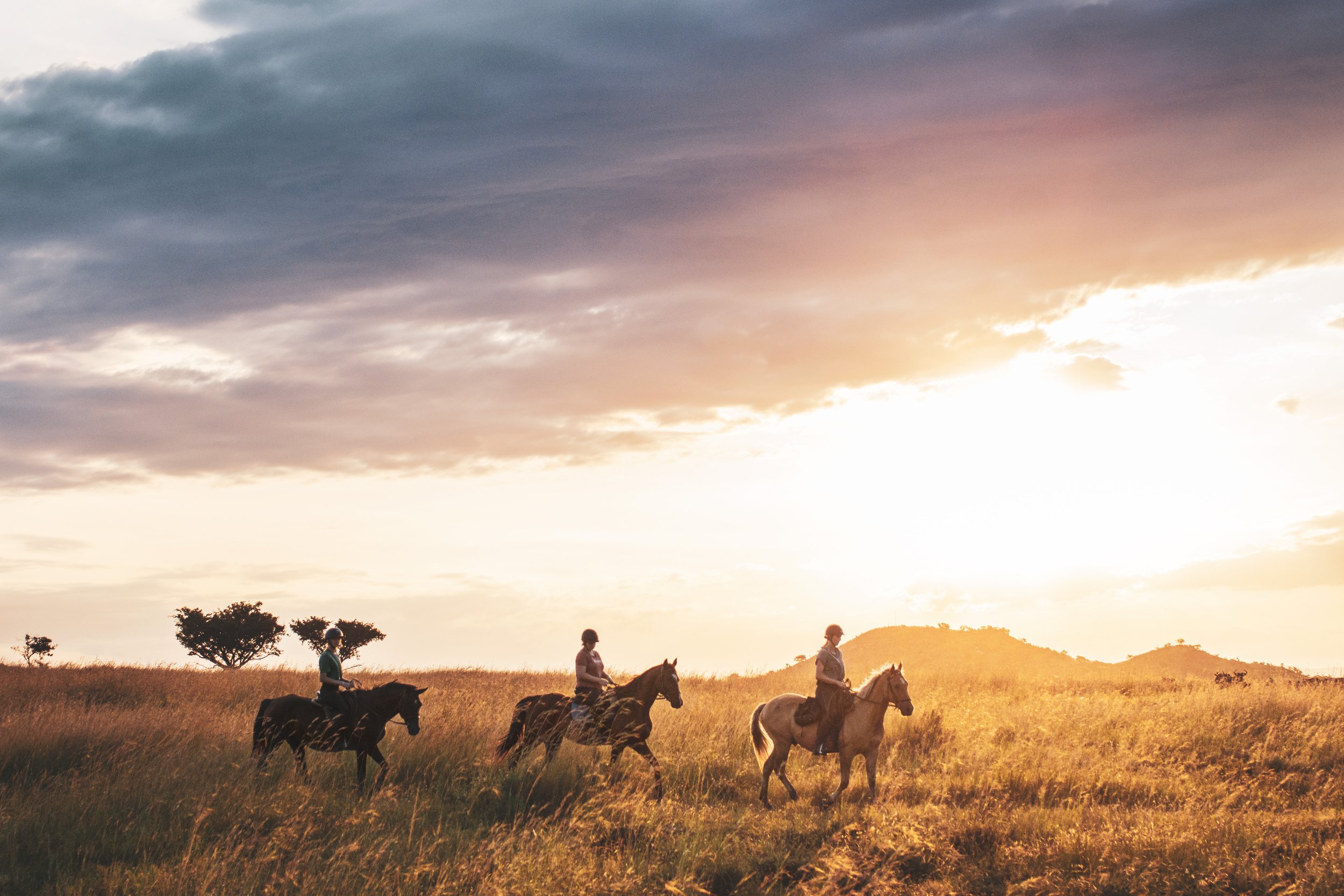Tamlyn aboard one of her favorite horses, Prince.
Tamlyn is always there to greet guests with a brilliant smile, clean and crisp riding clothes, and an impeccably professional demeanor that might seem better suited to a corporate office or a hotel conciergerie, yet she has no problem getting her hands dirty in the African bush, sleeping out under the stars, and putting in the hard work it takes to run her business, The Horse Safari Company.
Tamlyn was a founding member of Out In Africa Safaris before she started her own company.
What came first, the safari or the horses?
Good question…I actually can’t distinguish, it’s all very intertwined.
How old were you when you learned to ride, and where?
I grew up with all the girl cousins on both my English and Afrikaans side riding. Especially my English side. We started with some lessons in the Freestate at the age of 7 but it was short-lived. The love for horses never died and we eventually found a new place to ride at the age of 14 and we (my sis and I) competed in show jumping. And yes, I had some really scary riding instructors. We each ended up with two competitive horses. I soon decided the competition scene was not something I felt passionate about but rather just the horses and riding. I took my one horse with me when I went to study Nature Conservation. I only had a very small break from horses when I worked in the bush. When I finished my time in the bush I ended up with a riding school for a few years. And just always had horses ever since.
Who was the first horse you remember?
Clyde our black riding school pony
Tamlyn in her element.
Did you ever consider a career outside of guiding?
I actually never wanted to be a guide, I was far too shy for it. There was a time where I thought I would become an artist and lock myself up in some remote bush veld home and paint all day. Fortunately, I was never such a good artist!
How did you get into safari guiding, and how did you come to unite that passion with your passion for horses?
I grew up going on Safari, as my dad’s business partner had a bush home deep in the Timbavati [Game Reserve] bordering Kruger [National Park] but I also grew up riding. I saw an article on horse safaris in the Delta (Botswana) when I was about 16 ( I am now 40) and it planted the seed. When the time came to leave school I knew I wanted to be in the bush with horses but I wasn’t entirely sure how to go about it. So, I studied Nature Conservation. I worked as a normal guide at some of SA’s top lodges and eventually over time I got involved in the horse safari industry. When I felt I had enough experience in the bush by vehicle and on foot safari, I started feeling confident to pursue my interest in horse safaris. I honestly never thought I would be a horseback guide or a business owner. I always wanted to be involved in horse safaris even if it was just helping to tack up horses. I guess because I grew up with my dad owning his business, it was only natural for me to go that route.
Riding horses is a unique way to see rhinos up close in the wild.
What was it like to try and break into the horse safari industry?
I am still the baby amongst the operators as I have been doing this for approximately 12 years.
What makes a good safari horse? Who have been some of your favorites over the years?
For me it’s a horse that doesn’t overreact to situations. One of those horses that has a sturdy temperament. (yes, those are hard to find, so we just need to keep on exposing those that are not so brave). I don’t like a high-strung horse for safaris, I find it exhausting. An easy keeper with good hooves of course helps, too. Size-wise, not under 15.1 and not over 16 hands. I love the Boerperd (a South African breed), they just do so well in our environments. I had a Boerperd called Sam that use to show me buffalo and elephants by twitching his ear in a certain way and then my Gordon that recently passed away. Boerperd-Arab cross, just one of the most reliable horse I ever had. And such a gentleman.
What are some of the things you do with the not-so-brave horses to get them used to the safari environment and trained to carry guests in the bush?
Teaching horses to stand still while viewing game is no easy feat!
Some horses are not as brave as other. I have had some of my most ‘not-so-brave’ horses become lead horses. There is hope for them all. I am a bit of a believer in setting the horses up for success. Exposing them a little bit at a time will eventually get you there. Time and patience are important and if one is in a position to offer that to such a horse you very likely will get them to a point that makes them more brave and confident.
What have been some of your craziest/scariest/most epic/most interesting events or stories that have taken place on your safaris?
I have ridden horses in many different places and each one had different animals and challenges.
Tamlyn overlooking the Nkomazi Game Reserve, a World Heritage Site.
I have ridden between right in between lions with their green/yellow eyes staring at us from all angels, fortunately on this day the wind was very still and the horse did not even react to the lions, so we could peacefully walk past them without any drama. I ride with a Bear Banger and it always hangs on my saddle ready for action. Later on once we returned to our fly camp and the horses and people were having a rest my bear banger went off ( a very noisy flare). We were all still a bit excited from riding through the lions in the morning, our minds went straight to the image of the lions getting into our makeshift horse camp and thinking that the groom had set off a warning shot. Myself and my two volunteers started running to ‘save the horses’ only to find out the horses had played with the bear banger that was hanging on my saddle, making it go off. What a relief for us… and of course we had to laugh about it. Needless to say, the horses did not go anywhere close to the tack for a long time.
Who have been some of your role models, either in the horse industry, safari industry, or tourism industry?
Philip Kusseler from Wait a little and Roby Foot from Botswana ( Ride Botswana). Phillip and Robyn have both been kind enough to share his experiences, mentor me and to give advice the fact that any of these big name safari operators would give me any of their time is hugely appreciated.
As far as training methods and theories, I follow Equitation Science, Clinton Anderson, Monty Roberts, and Michael Peace.
A superb moment with a cheetah at Nkomazi Game Reserve.
What are some things you wish more guests knew or did before coming on a riding safari?
Going on a normal safari before doing a horse safari, as then they truly can understand how magical a horse safari is.
Where else have you traveled to ride?
Unfortunately not too many places. Ridden in Botswana, Zimbabwe, UK, Eswatini, Australia.
What other riding destinations are on your bucket list?
India, South America, and Ireland.
Golden hour on a private game reserve, riding with no one around, feels like you have the world to yourself.
Take us through a typical day on safari, and a typical day as a guide.
Wake up way before anybody else to plan your day, check that the horses are ready for the ride, get guests to the horses for riding. Get started with the ride and be super focused, you want to keep everybody safe out on a ride.
Get back and make sure your guests are sorted with everything they might need. Maybe join them for breakfast, sometimes not. Depending on the afternoon ride you need to plan the logistics around that e.g will we do a sundowner or not. Check on horses for the afternoon ride. ( I normally plan to have enough horse feed for the duration on a safari so those logistics would have been sorted out before guest arrival). Check on horses for injuries and illnesses. One needs to check that the grooms are doing their work around these horses and that the yard is still ticking on smoothly. A little break and some admin before getting back into the saddle, where you need to be super focused again to keep every one safe. Dinner with guests at times and a glass of wine to end the day.
Any words of advice for riders interested in becoming safari guides?
If you’re not 100% passionate, don’t do it.
What are some of the obstacles and challenges you have had to face? I know Covid was a hard hit, and you’ve had to move several times, if you want to chat a bit about that.
Covid was devastating for my little safari business. As I mentioned, we are the babies in the industry and it takes a very long time to make a name for the company. We were and are still in that stage. We had just gone through a court case before the pandemic, where a guy tried to steal my horses from me. Financially, it was very tough to recover from this alone, never mind the pandemic. (We won the case but the other party wanted to appeal, we ended up settling out of court).
So, from a court case to a pandemic, it has been challenging for sure. I had about 2 years of having to do fundraising for my horses. Absolutely humbling kind of stuff, that. Like I mentioned, it takes so long to make name in the industry and when the pandemic hit we did not know it would take so many years to go back to normal. I did not want to throw away all the years of hard work. So we stuck it through. And of course we wanted to keep the herd together.
I also had several business partnerships that ended up not being what it was meant to be. But we will just call theses stepping stones.
What are some of the biggest challenges you face currently with horseback safaris?
As you know, I have had to move from a beautiful reserve because tourism has not fully returned yet and I had to change my game plan to survive.
Volunteering is a great way to lessen the cost of a riding safari vacation while gaining superb field experience on horseback.
Talk a little bit about the volunteer program.
Volutourism has been growing over the last 10 years. People love horses and our horses love the extra attention and love. Why not come have a cheap holiday and live with horses? My volunteers mostly help keep horses fit. Very minimal hard work happens with the Volunteer program. Mostly grooming and tacking up of horses for oneself and guests. I also love having the consistency of people staying for longer.
What are the minimum requirements for volunteers?
Volunteers must speak English and need to be a good rider (10 years in the saddle will be helpful but we are open to 5years at the moment).
What is your vision for the future of the Horse Safari Company?
I would love to ride in a beautiful environment with good wildlife, with 30-odd well looked-after horses. I hope we can create a few good jobs to help the community and keep wild places going.












